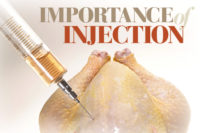Chicken Media Summit 2013: The importance of animal source foods

Exclusive Q&A with John Starkey, president of USPOULTRY
LISTEN NOW >
It is only fitting that protein would take the center stage at the opening of the 2013 Chicken Media Summit. Not only was chicken the delicious main course at the opening reception/dinner, but it was also a central part of the keynote address that discussed the role of protein in providing the needed nutrients to the growing world population.
CMS 2013, organized by the National Chicken Council and the U.S. Poultry & Egg Council, has brought together more than two dozen journalists from both the trade and consumer press to hear several panel discussions and take a tour of a hatchery and a Sanderson Farms processing plant.
The keynote address at the opening reception was “Enriching People's Lives: A 2013 Report on the Importance of Animal Source Foods,” courtesy of speakers William Weldon, Ph.D., and Susan Finn, Ph.D. Weldon is the vice president of research and development for Elanco Animal Health, and Finn is the president and CEO of the American Council for Fitness and Nutrition. The focus of their talk was on food security. While that term is sometimes used in discussion with keeping the food supply safe from terrorist attacks, in this context it refers to the availability, access and utilization of food. It concerns not just the issue of quantity of food, but also of quality, Weldon explained.
Hunger, he said, is the #1 global health risk. Anywhere from 2 to 3 percent of a country's national income is lost to hunger. Animal source foods, such as meat, eggs and milk, provide the key micronutrients and high-quality protein needed to sustain a population. For people in developing countries, living on less than $2 a day, such as Africa, they improve brain, muscle and skeletal development. For those in emerging markets, such as Brazil and China, they help diversify one's diet. For those in developed countries, such as the United States and Europe, animal source foods lessen chronic disease risk and obesity.
Without a balanced diet, Finn explained, there is a lack of essential nutrients, which leads to a lack of productivity as societies fall short of their potential. Malnutrition can take on many forms; obesity is a type of malnutrition, as it is an example of getting the wrong type of nutrients. Finn noted that 1 in 3 people in developing nations are deficient in micronutrients. The addition of even 100 grams of chicken a day to a cereal-based (rice) diet can help provide needed nutrients like iron and zinc.
Finn also noted that the egg, which is considered unhealthy by some is a perfect source of “power-packed protein that we need.” She called on the journalists in attendance to help tell the story of the value that eggs, chicken and other animal source foods provide and how they can help fix the solvable problem of malnutrition.
Looking for a reprint of this article?
From high-res PDFs to custom plaques, order your copy today!






